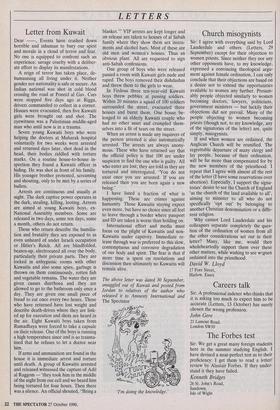LETTERS Letter from Kuwait
Dear —, Events have crashed down horrible and inhuman to bury our spirit and morale in a cloud of terror and fear. No one is equipped to confront such an experience: savage cruelty with a deliber- ate effort to display its manifestations.
A reign of terror has taken place, de- humanising all living under it. Neither gender nor nationality is safe or secure. An Indian national was shot in cold blood crossing the road at Poneid al Gay. Cars were stopped five days ago at Rigga, drivers commanded to collect in a corner. Houses were evacuated, then five Kuwaiti girls were brought out and shot. The eyewitness was a Palestinian middle-aged man who until now is in a trauma.
Seven young Kuwaiti boys who were helping the doctors at Muharak hospital voluntarily for two weeks were arrested and returned days later, shot dead in the head, their bodies riddled with torture marks. On a routine house-to-house in- spection they found a Kuwaiti officer in hiding. He was shot in front of his family. His younger brother protested, screaming and shouting, only to be met by a series of bullets.
Arrests are continuous and usually at night. The dark captive power operates in the dark, stealing, killing, looting. Arrests are aimed at young Kuwaiti boys, ex- National Assembly members. Some are released in two days, some ten days, some a month, others do not return.
Those who return describe the humilia- tion and brutality they are exposed to as even unheard of under Israeli occupation or Hitler's Reich. All are blindfolded, beaten-up, electrocuted all over the body, particularly their private parts. They are locked in unhygienic rooms with other Kuwaitis and also some spies, garbage is thrown on them continuously, rotten fish and vegetable remains. The water they are given causes diarrhoea and they are allowed to go to the bathroom only once a day. They are given one small piece of bread to eat once every two hours. Those who have returned have lost weight and describe death-drives where they are link- ed up for execution and shots are heard in the air. Eight Kuwaiti boys taken from Rumadhaya were forced to take a capsule on their release. One of the boys is running a high temperature since and is so trauma- tised that he refuses to let a doctor near him.
If arms and ammunition are found in the house it is immediate arrest and torture until death. A group of Kuwaitis arrested and released witnessed the capture of Adil al Raggom — 'they took him in the middle of the night from our cell and we heard him being tortured for four hours. Then there was a silence. An official shouted, "Bring a blanket."' VIP arrests are kept longer and on release are taken to houses of al Sabah family where they show them sex instru- ments and alcohol bars. Most of these are old men and women's houses. Thus an obvious plant. All are requested to sign anti-Sabah confessions.
One group of boys who were released passed a room with Kuwaiti girls nude and raped. The boys removed their dishdashas and threw them to the girls to wear.
In Firdous three ten-year-old Kuwaiti boys threw pebbles at passing soldiers. Within 20 minutes a squad of 100 soldiers surrounded the street, evacuated three houses and burnt them. One house be- longed to an elderly Kuwaiti couple who had no other asset and crumpled them- selves into a fit of tears on the street.
When an arrest is made any inquirers of the person arrested is also automatically arrested. The arrests are always anony- mous. These who have returned say that the official policy is that 100 are under suspicion to find the one who is guilty. All who enter are lost; they are told as they are tortured and interrogated, 'You do not exist once you are arrested. If you are released then you are born again a new being.'
I have listed a fraction of what is happening. These are crimes against humanity. Those Kuwaitis staying expect even more, but have no choice since all feel to leave through a border where passport and ID are taken is worse than holding on.
International effort and media must focus on the plight of Kuwaitis and non- Kuwaitis under captivity. Immediate re- lease through war is preferred to this slow, contemptuous and corrosive degradation of our body and spirit. The fear is that if more time is spent on resolutions and discussion then ultimately no Kuwaitis will remain alive.
The above letter was dated 30 September, smuggled out of Kuwait and posted from Jordan to relatives of the author who released it to Amnesty International and The Spectator
`I'm doing the knowledge.'


































































 Previous page
Previous page